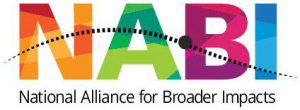In times when political and economic international cooperation are increasingly important, the scientific community, universities, and support networks such as NABI (National Alliance for Broader Impacts, in USA) and RIC (Research Impact Canada- Réseau Impact Recherche Canada) based in Canada), have expressed our continuous interest to collaborate, partner, learn, and share best practices across borders.

NABI is currently the leading US network organization for broader impacts (BI) composed of 719 individual members representing over 263 universities and organizations. NABI efforts have been primarily funded through a NSF -National Science Foundation (US) Research Coordination Network grant (MCB-1408736), aiming to expand the BI community of practice. NABI’s overarching mission includes building institutional capacity, advancing BI, and demonstrating the societal benefits of research to their stakeholders (e.g., industry, government, NGOs and general public). In 2017, NABI organized a national convening to explore and identify current needs and solicit recommendations amongst its network associates. These events and further discussions led to the publication of its “Current State of Broader Impacts: Advancing Science and Benefiting Society in January 2018.”

RIC is the leading knowledge mobilization network in Canada composed of 17 universities, it integrates a unique Pan-Canadian structure of institutions and committed individuals working to strength institutional capacities for knowledge mobilization. 2017 was also a unique year when the network incorporated University of Alberta, University of Winnipeg, Dalhousie University, Western University, the University of British Columbia and its first international member, University of Brighton (UK). This year marked an important growth not just in the expansion of members, but in the network’s own institutional development. Examples of this are the launch of the new strategic plan 2017-2020, focusing on the new strategic priorities and providing leadership to the establishments of committees such as the Evaluation Committee, who worked with RIC members to develop the first network’s logic model that will serve to evaluate ongoing efforts of Research Impact -now as an international network; another highlight was the establishment of the Communications Committee who pulled together expertise and insights between the members to re-design and update the recently launched website.
As described, 2017 and now 2018 have been intense months for the growth and expansion of both organizations. NABI and RIC as international partners have a share goal of maximizing the impacts of academic research, namely through knowledge mobilization or BI activities. For both partners there is a need to further increase understanding of the value of research impact or BI in their perspective latitudes. Both organizations recognize the need to strength a culture of research impact or BI, meaning to design, implement and be able to assess the nature and impacts of research in the non-academic domains.
Both organizations are committed to studying and identifying ways to progress the institutionalization efforts of the field. One important achievement is a future ‘common language or shared language’; as expressed above, in Canada the term ‘knowledge broker’ is more broadly understood whereas in the US the term BI professional is becoming accepted as a catch-all for the varied types of positions that touch BI work. Is it BI? Is it knowledge mobilization? Are these synonyms? These are questions we will address, as part of our ongoing dialogue.
A shared challenge where both organizations are currently working on is the clear criteria for impact assessment. This relates to the institutional aspects of knowledge mobilization or BI as a specialized field that has received traction in recent years. Efforts to established regional, national and international communities of practice and future scholarship will benefit from the ongoing cooperation between these organizations.
Finally, as both organizations move to institutionalize the field and measures of success, another potential area of work for both RIC and NABI is the development of tools, applied frameworks and useful criteria that will serve educational efforts such training scientists and (under)graduate students to better understand the notion of impact itself. Other tools that seek to quantify and evaluate the individual and collective impact of RI/BI work at an aggregate level will be useful in assessing the true impact of our work on a local, national, and international scale.
David Phipps (RIC) and Susan Renoe (NABI) recently met to discuss advancing collaboration between our two networks. We will be advancing discussions on many of these issues in the months to come. Overall, this is an excellent time for the internationalization of Research Impact Canada and NABI.
By: Marcelo Bravo and Sara Vassmer
Marcelo Bravo is a PhD Candidate in Interdisciplinary Studies specialized in Policy and Social Innovation at the University of British Columbia; his research looks at co-designing knowledge mobilization institutional constructs: scholarship, models and research, and the teaching and practice of Strategic Design for complex problems. He is the Policy Studio research lead at the Liu Institute, part of the UBC School of Public Policy and Global Affairs.
Sara Vassmer, PhD, is the program coordinator for the National Alliance for Broader Impacts (NABI) and Associate Director of the University of Missouri Connector, a resource office spanning the connection between research, outreach, engagement, and Cooperative Extension.